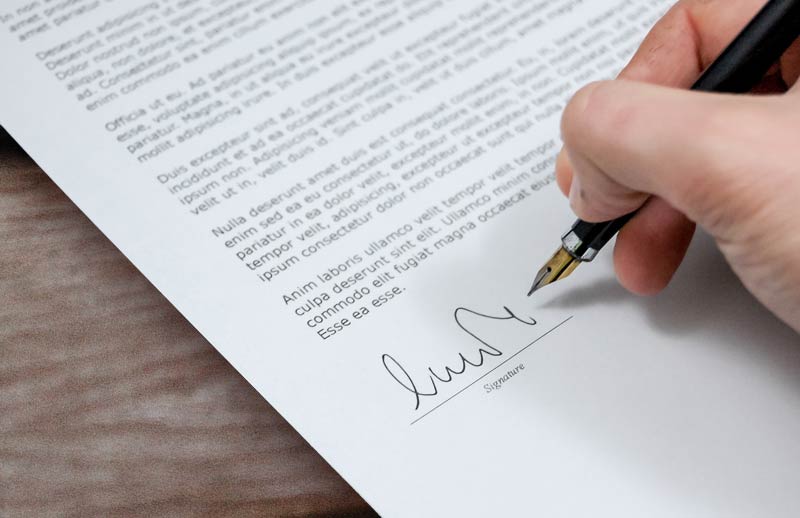What is certified, accredited, or sworn translation?
Certified translations bear the statement “certified as being an accurate translation of the original,” accompanied by a seal, dates, and the signature of the certified translator. These are also sometimes called “sworn” translations. They guarantee authenticity and add an official dimension to the document. These translations can only be done by professionals – certified translators – recognized by the relevant authorities.
When might certified translations be required?
Certified translations can be required for certain administrative procedures and normally concern official documents, such as those related to civil status (excerpts from birth certificates, excerpts from marriage certificates, death certificates, wills, divorce decrees, driver’s licenses), professional documents (articles of association, balance sheets, tenders, patents), legal documents (rulings, notarized documents, bailiff proceedings, administrative documents), as well as diplomas, transcripts, medical certificates and summaries, insurance certificates, etc.
In the world of business, the use of certified translations for business contracts, transport documents, technical documentation and other certifications helps lower the risk of litigation.
Certified documents translated by certified professionals produce the same legal effect as the original for both French and foreign institutions. They must be accompanied by a unique registration number.
What is a certified translator?
Certified translators are legal experts approved by the Commission of the Court of Appeal or by the Public Prosecutor following a commission that convenes once annually. For their certification to be recognized by the French administration and the courts, they must be officially sworn in before these authorities.
In order to become certified translators, they must provide evidence of professional translation training (M.A. in foreign languages or degree from a specialized school) and extensive professional experience, as well as submit a request with the District Court in their jurisdiction.
The certification ensures that they have the necessary qualifications to produce a translation that accurately represents the original. By adding their stamp, certified translators indicate the jurisdiction where they were sworn in, as well as the languages for which they are qualified. Each page of the translation must be numbered. Paragraphs must be numbered as well, and the end of the document must be clearly marked so that no text can subsequently be added, modified, or deleted.
Sworn translators are bound by strict ethical standards for legal experts and are required to keep up to date with their technical and procedural knowledge, guaranteeing a high-quality translation.
As legal officers, certified translators also provide all types of translation or interpreting services needed for legal proceedings (detention, questioning, hearings, investigations, etc.).
They work in both the private and public sectors.
Introduction to the profession/context for becoming a sworn translator
Most expert translators are freelancers.
There are 30 Courts of Appeal in France, excluding overseas territories. Each court appoints experts annually depending on its specific needs. Translators must reside within the jurisdiction of the Court of Appeal to which they are applying, but once appointed, they are recognized as such throughout France. There are about 1,500 translators with the title of “expert translator.”
The best strategy is to first analyze the official lists to identify Courts of Appeal with a need for more translators or interpreters in your language(s), which means you should also consider the location of immigrant communities. Ex: The Court of Appeal of Nice probably has a greater need for Italian translators than the Court of Appeal of Poitiers.
Finally, current experts are required to retire at the age of 70. Doing a quick search for the age of the resident experts can also help you prepare for future openings. To apply, all you need to do is fill out a candidacy application which you can find on the website of your region’s Court of Appeal.
What should I do if the certified translation is intended for a different country?
Additional steps may need to be taken to ensure that a document translated and certified in France is recognized by a foreign country that has not signed bilateral treaties with France. These are legalization and the apostille certifications. They involve authenticating the translator’s signature, either through the local city hall or a notary. The certified translator must be present to submit both the translated document and the original. A business document can also be authenticated at your local Chamber of Commerce, or at an embassy or consulate if the translation was done abroad.
How can we help you?
Our large team of certified translators can quickly and, when needed, urgently translate all of the above documents into and out of any language, as long as French is the language of either the source (out of French) or target text (into French). We will select our most qualified translator based on their area of specialization.
All of our translators are qualified and expert linguists who are professionals in their area of specialization, guaranteeing the accuracy of their work.
Send us an e-mail with information about the type of document you need translated. Eventually please send us a digital copy of it. You will soon receive an estimate and the earliest delivery date.
The translator must have this document to be able to certify the translation as “an accurate translation of the original.” The delivery date is calculated from the moment the original is received in the mail. Once printed and certified, the duly translated document will be returned to you by mail.

